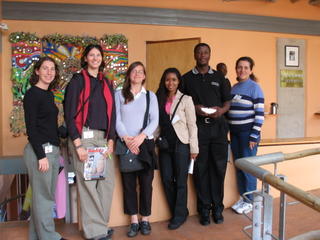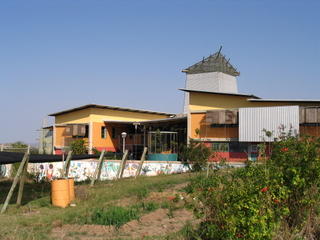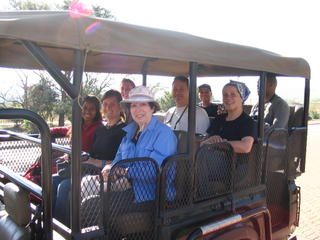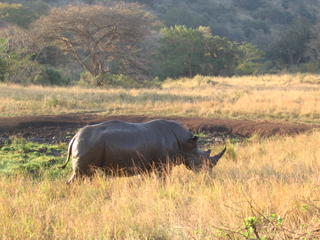MGH Institute Students Blog from South Africa 2005
MGH Institute nursing student visit South Africa.
Monday, September 12, 2005
A Time to Remember
Travel to South Africa enhanced my knowledge of caring for patients who are HIV/AIDS infected. It amazes me that in the three years of my nursing training in the United States I have not provided care for this patient population. S. African nursing students are expected to have a thorough knowledge of the disease process and treatment of HIV/AIDS upon graduation. This is necessary since 1/3 of the population is infected. I learned of the physiological and psychosocial needs of this population. Many patients who are infected experience isolation and shame as a result of the stigma that is attached to the diagnosis. Family members may avoid personal contact with the individual for fear that they will also contract the virus. I remember one young woman, age 30, who experienced the hardship that comes with stigma. She was near death when she started receiving ARV therapy. Her family did not permit her to live in their primary residence and instead built a home out of scraps of metal for her and her son. We visited her home and were appalled by the living conditions. There were visible holes in the ceiling and no place for comfortable rest. The visiting nurse who accompanied us explained that this young woman was treated very poorly by her family, especially her father. I went home that evening feeling sorrow in my heart, wishing that I could do more to support people like her.
Despite the stresses of poverty and illness, many South Africans maintain a sense of hope. There was an apparent reliance on God and spirituality. This was evident in the patients as well as in the staff caring for them. One clinic providing ARV therapy interrupted their morning registration process for worship. Staff lead the songs and patients joined in collectively. Following song, clinicians provided a few words of encouragement based on scripture. The importance of spirituality was also evident in a rural hospital in which the staff gathers together for worship and prayer each morning prior to providing patient care. Spirituality is often encouraging and it was nice to see how this culture of people used it in a field where encouragement is most needed.
These are just a few examples of the experiences that I had in South Africa. I learned a lot about the healthcare system and about the history of the country. I hope other groups of students from the IHP have an opportunity to take this wonderful course.
Nikki
Tuesday, September 06, 2005
Time for Reflection :)
It has been just over a month since our return from Durban and I find myself still thinking about just how wonderful this International Health Experience has been. I find myself looking at nursing and the healthcare field through new eyes and I feel that I have only begun my journey in Nursing. I have felt drawn to nursing from the start because of the holistic approach to patient care and my respect and appreciation for the nursing profession has grown tremendously in the last two years since I have been at the Institute! Upon returning from South Africa, I find that I am also drawn to using my nursing to work with those who are most vulnerable.
We had the privilege of meeting many people suffering from AIDS in South Africa. It was quite humbling to talk with people about their struggles due to AIDS. Many situations we were told about were almost incomprehensible to me….that people can endure so much suffering….it renews my faith in the strength of the human spirit. We were fortunate to meet Nurses and Physicians who are working to relieve the afflictions caused by the AIDS virus in South Africa. For me it was inspirational to meet healthcare professionals who were so deeply motivated in their work.
One surprise from this trip…I have found that this experience has caused me to see research in an entirely new light. I have never found research particularly intriguing; however, learning about the field research being done in regards to AIDS vaccines, ARVs and their use with pregnant women and babies, adherence to ARVs, etc…there is so much that can be gained that will hopefully help to lead to a cure and at the very least a reduction in suffering.
The most memorable part of my experience…The Sinekethemba AIDS clinic at McCord Hospital in Durban. I know we have talked about this in our blog…One particular morning I was at the clinic during their morning prayer. The patients arrive at the clinic anytime after 6 am to register for their appointment (it could be an initial ARV consult, a follow-up to check their labs, a sick-visit, etc.). The people are patiently waiting, sitting in order of arrival, and at 7:45 am everything stops. In unison, everyone (patients, nurses, doctors, research coordinators) join in singing a beautiful gospel song, followed by a reading, and one more song to begin the day. The singing was quite moving. Seeing people suffering from AIDS and those working to help all joining together singing was an unbelievable experience. It again reinforces for me the power of the human spirit. I found out that this clinic also has a choir that performs and have a cd….I was listening to the cd the other day and there is one song that says it perfectly,
“Dear God, help us find a cure”
-Meghan
Thursday, September 01, 2005
What an experience !
The warm memories and experiences of this trip will stay in my heart for ever. The trip was as exciting and wonderful as I thought it would be. We went to so many places and had the privilege to see a side of S. Africa not usually seen by a regular tourist. I consider that in itself a blessing because it is the only way to really learn about a country. I was very impressed by the warmth of everyone we met. We were greeted with smiles, kindness and generosity everwhere we went.
Like my colleagues I was moved by the disparity of wealth and poverty which we witnessed from the very first moment we set foot in Durban. Durban in a cosmopolitan city with an outstanding infrastructure, modern buildings and prosperity. At the same time poverty and need was mixed with riches everywhere. We quickly learnt about the difficulties for survival of the poor.
It was also very difficult to face the HIV-AIDS problem first hand. It not the same to read about it in a book or hear about it from a TV program. It definitely was a humbling experience to see the patients in the HIV clinics we visited fighting for their lives with minimal resources and keeping their faith and their spirtis up. We were witnesses to the social problems that HIV-AIDS bring to the population like the many orphans left behind with no support or the increasing number of households run by children or grandparents.
We were also witnesses to the dedication and generosity of the many healthcare workers we met throughout this trip. The care takers, the nurses, the social workers and the doctors were all performing their mission with pure love. The hand of God was there.
But I also found S. Africa to be a vibrant modern country. I felt that people were working together towards positive social changes post-apartheid. Understandably it is not an easy task, and all the injustices may never be erased but I saw hope and a positive attitute. I saw many opportunities to grow and prosper.
I will keep a fond memory of S. Africa and its fascinating cultures and traditions. I hope my return trip is not too far in the future !
Carmen
Wednesday, August 31, 2005
What wonderful memories!
My memories include: worrying as to whether everyone would get to Logan Airport in time for the 6:10 AM flight(we did!); doing my "night nurse" routine and checking on members of the group during the flights (they were fine and I got my exercise to prevent DVT's); seeing Costa at the airport to greet us; going to dinner our first evening at Jenny and Costa's home to bid old friends and colleagues Kathy and Dotty farewell; seeing friends and colleagues at Highway Hospice,the Nursing School at UKZN, McCord Hospital, Church of Scotland Hospital where we also visited an orphanage and went on home visits, St. Mary's Hospital, Lamontville Township feeding program, Africa Center, Crompton Hospital,Inkosi Albert Luthuli Hospital, and the Doris Duke Research Center at the Nelson Mandela Medical School(UKZN)and much more.
People always make the difference in every trip. There are so many people who made our trip memorable and we're grateful to all of them. Many have been special friends for a number of years. Although I won't mention names I will make one exception with Costa and Jenny who were incredible hosts. They did far more than rent us rooms. Their thoughtfulness made for a wonderful trip for the group.
Culturally, we visited a flea/craft market, saw Durban and environs, had a picnic breakfast at Tala Private Game Reserve, attended the African Footprints production, had a weekend at the beach, saw the uShaka aquarium, St.Lucia Wetlands,and Hluhluwe Game Park among other activities.
A special treat for us was the presence of the President of the MGH Institute of Health Professions for the first few days of our stay. She came to be with us and to express her support of the international activities of the Institute. We were all sorry to see her leave.
We squeezed a lot of activities into a very brief period of time. It was special for me not only because of our South African colleagues, but also because of the composition of our group. They came on this very first educational venture abroad for us as an educational institution when not all of the details had been worked out because they were committed to learning more about international health care. They came and we were all conquered with the commitment to return.
My gratitude to all who helped make this possible- who supported us in large and small ways both in South Africa and in the U.S. Thank you also to those who have decided to support the work of our South African colleagues. Inge
Tuesday, August 23, 2005
Nation of contrasts
In retrospect, South Africa seems to be a nation of contrasts, the most striking being the division and distribution of wealth. Huge mansions with walls around their borders and caged doors sit next to (and sometimes even a block away from) miles and miles of "informal settlements," which is a very "nice" description for the millions of homes that have been build by the people (illegally) that grip to hillsides and areas just outside of major urban areas. The informal settlements do not have government-supplied sanitation or electricity, and people use plastic trash bags as roof-tops. It is rumored that the government has begun a housing project, where a sturdy home of wood or brick will be built for every family in a settlement; however, according to a South African I met, "it will take over 100 year at the rate they're going." I am not sure of the proportions of people living in informal settlements to those living in mansions, but I would suspect that it mirrors the ratio of those with health care to those with none: 5:1.
Another contrast: in the few settlements I observed and in other communities throughout the country, people were pulling together. South Africans are very proud of where they live, and they identify with and want to help others around them. Florence, a "retired" nurse and dear friend of Inge, works day and night for her community; she runs a soup kitchen that feeds hundrend of the sick and injured daily, and she is building a health center for AIDS and hospice patients. People love her, they trust her, people want her near them as a leader. Then, we have the counterpoint: crime rates are extremely high in South Africa. Theft and rape are major problems, and they are crimes diametrically opposed to the neighborhood trust I just described. It seems to me that the crime in South Africa is directly related to poverty and to the lingering sting of apartheid. Despite these problems, I never once felt threatened or scared, and if I did, I believe that a mere "yelp" would have garnered the help of many.
The next conrast has to do with racial tensions in the aftermath of aparthied, which ended only 11 years ago. I think that South Africa has come a long way, especially in terms of equality in politics and law (at least on the surface). In the cities especially, the populations seem to be more diverse and integrated than in smaller, more rural towns. That's not to say that the urban areas are completely intergrated: they aren't, but neither is Chicago, New York, LA, etc. However, there still exists extreme racsim along with major differences in income, academic and employment opportunities, and access to resources, like healthcare, between races and gender. Hopefully with time these discrepencies will diminish, as they are slowly doing in our country. Just talking to people elicited different responses about the situation in South Africa since Apartheid; several people I spoke with think that they have come a long way but still have a long way to come. On a good note, at the various healthcare settings we visited, from small clinics to large hospitals, the workers and patients - of many races - worked together and were treated side-by-side as equals.
Sub-sarahan Africa in general and South Africa in specific have been struck by the HIV and AIDS epidemic. Admist the pain, sorrow and difficulties that surround the impact of HIV, hope, altruism and love are clearly evident and seem to outweigh the hardships. And that gives me hope. I think that is why people love the 80s music in South Africa: to me it is a music (corny at times, yes) filled with compassion (remember "We are the world?") and messages of community, love, and hope for a better future.
Courtney
Wednesday, August 17, 2005
Reflections on South Africa
I returned from South Africa approximately three days ago and I am just beginning to recover from the jet lag (although I do enjoy waking up and feeling awake at 5am). In any case, I will try to summarize my overall impressions of my experience in South Africa.
One of my first impressions of the country and the one that has remained with me throughout my travels was the incredible vibe that I felt there. There was a political vibe, a cultural vibe, and a spiritual vibe. Politically, the country continues to recover from the apartheid years and the effects of apartheid are still very prevalent; particularly the existence of townships. Culturally, the country is so incredibly diverse that it pulses with diversity and multiculturalism. South Africa has the largest Indian population outside of India and eleven national languages! Spiritually, South Africa is vibrant. We saw this spirit displayed in several ways, from protests to prayer ceremonies. On two separate occasions we witnessed protesters doing the characteristic toyi-toyi dance to demonstrate their cause. One protest was among workers at the local "Pick and Pay" supermarket. The other protest was in a rural area called Tugela Ferry. Protesters there were holding signs that read, "Away with Sex"; most likely because the rural areas have such high rates of HIV infection. Song and dance is used often in South Africa during prayer and other ceremonial acts and is very very effective.
A major focus of our international health experience was the issue of HIV/AIDS. We began to understand why HIV and AIDS are so rampant in South Africa and what is being done (or not being done) to curb the devastating effects of the disease. South Africa is more developed than most other African nations, yet the problem of HIV in South Africa is the worst. I can only explain this by considering that as a developed nation, South Africa has easier and faster modes of transportation. Men, in particular, will leave their homes to work in mines or other faraway destinations. People are undereducated and traditional belief systems are prevalent. Women are marginalized to a considerable degree and many men have multiple sexual partners. Condoms are not widely used. The idea of testing for HIV is nonexistent for many people because of the incredible stigma of being infected. The rollout of antiretroviral medications is extremely slow and only began last year. Traditional remedies of olive oil, potato, leeks, and garlic are still endorsed by the minister of health. Only those who can afford to pay the monthly fee for medications are priveleged enough to have it in most places. Programs implementing ARVs have strict protocols for teaching adherence and only those who will be adherent will qualify for medications.
Tuberculosis is a common comorbidity of HIV/AIDS and more people will die from TB than HIV. People are typically treated for at least two weeks on TB medications before initiating antiretroviral medications. This is done to prevent an immune reconstitution syndrome whereby the latent TB bacteria surge do to a sudden resurgence of the immune system from the ARVs. This can actually kill people relatively fast so prevention with TB medication is necessary.
I am glad to have had the chance to visit such a phenomenal country and to have met so many outstanding people. People who work so hard despite the odds against them. It was an inspiring trip that truly changed my life. Thank you to Inge and everyone else at the IHP for making it happen. Thank you to Costas and Jenny for taking such good care of us while we were there. The group could not have been any better and it was a pleasure having Ann with us in the beginning.
Thank you again and Cheers, Lisa
Thursday, August 11, 2005
The African Centre
Friday. July 29th: The last Friday of our trip we drove to the region of Hluhluwe (shoosh-louie) located North of Durban. Our first stop was to the African Centre near the town of
The centre takes pride in its environmental friendly approach of management, and to being a source of employment to the town of
There is a lot more of information about the centre but in the interest of time I should finish here. However, if you want more information abut the center, and about their research studies you can visit their website at www.africacentre.org.za
Enjoy,
Carmen








